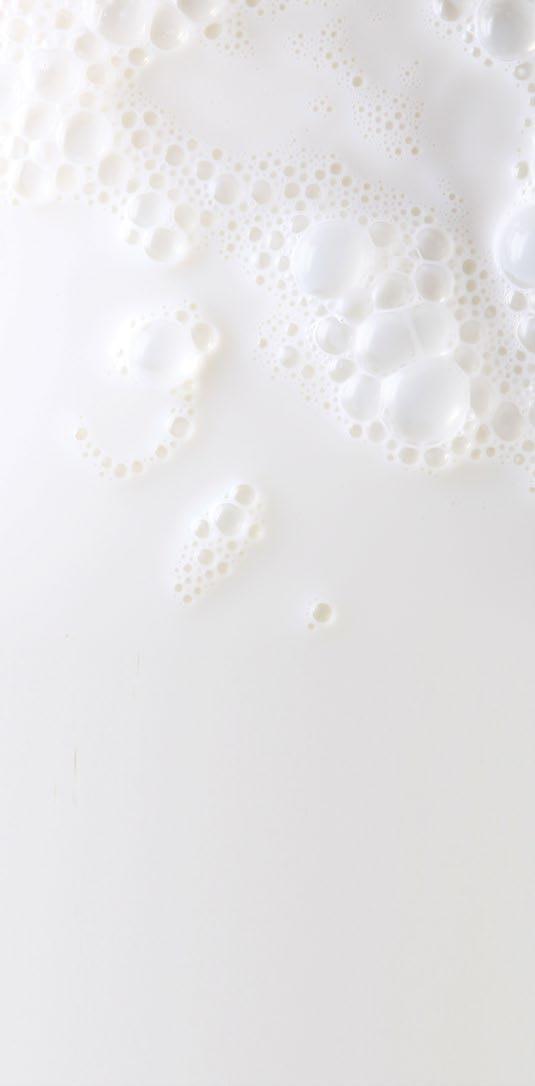
5 minute read
GOT MYLK?
By Abigail Baker
Cow’s milk may be a household staple for millions, but more and more individuals are choosing to find alternatives, whether for health, ethical, or environmental reasons. These include the astounding number of the population that is actually lactose intolerant (around 65%) and recent research linking milk consumption to a number of health risks, such as breast and prostate cancer, as a result of modern manufacturing practices like the use of mass antibiotics, pesticides, and routine growth hormones. Additionally, cutting out the moo milk can have a number of potential health benefits, including clearing up hormonal acne, lessening exposure to hormones and antibodies, increasing thyroid health, relieving digestive issues, reducing brain fog, and even sometimes aiding in weight loss.
Advertisement
Aside from the health benefits, cutting out traditional dairy can also help the planet (as well as, of course, the cows themselves). The dairy industry is not only notorious for its often cruel practices (cows are often forcefully impregnated, mutilated, confined, and dehorned in the name of milk), but they are also a great contributor to greenhouse gas emissions, and a natural resource-rich venture.
The good news is that there’s no need to say a sad goodbye to all that is creamy and milky, as there is an almost endless array of ‘mylk’ alternatives for you to choose from. Each option offers its own distinctive flavour, texture, and nutritional index…
Soy Mylk mild and creamy
Almond Mylk sweet and nutty
Coconut Mylk tropical and sweet

Oat Mylk mild and sweet
Rice Mylk watery and sweet
Hemp Mylk nutty and watery
PROS
This mylk most closely resembles the nutrition found in cow’s milk as it is high in protein, as far as non-dairy alternatives go. It is also free from cholesterol, low in saturated fats, and high in polyunsaturated fats and phytonutrients.
This one’s great for those trying to lower their calorie intake, as it contains just a quarter of the calories found in cow’s milk. It’s also a great source of vitamins E and A. It’s relatively low in nutrients such as protein and carbohydrates, and it contains an antinutrient – phytic acid - which can impair the body’s absorption of minerals if consumed in significant quantities. There is also some environmental concern about the water needed to grow almonds and the pesticides used to produce non-organic options.
CONS
Soy is a controversial ingredient as it contains large amounts of isoflavones, which can affect oestrogen receptors and hormones if consumed in large quantities.
Coconut mylk is the perfect option for those on a banting or reduced carbohydrate diet, as it has very few carbohydrates. Additionally, it contains MCT (medium-chain triglycerides) - an energy source that goes straight to the liver. It is also a great alternative for those who have a nut allergy, and it has little impact on the environment as it needs little water to produce. It is very low in protein but high in saturated fat, which could amplify certain health issues.
Oat mylk is high in fibre, antioxidants, polyphenols, and beta-glucan - which helps to lower cholesterol levels and maintain sugar levels. You can also find gluten-free varieties, and it’s cheap and easy to make at home. Lastly, oat mylk has a lower environmental impact than soy and almond options.
Rice mylk is the least allergenic of all the options, and is free from saturated fats and cholesterol. It’s a good alternative if you’re avoiding nuts, seeds, or legumes, and is more sustainable than almond mylk. It is a high GI drink (79 - 92), which means that it has the potential to spike blood sugar levels. It thus isn’t a great option for children, the elderly, and people with diabetes.
Oat mylk contains double the amount of carbohydrates found in cow’s milk but almost half the protein and fat. It also contains phytic acid, like almond mylk, which can impair the body’s absorption of minerals. Additionally, oats can often contain pesticides, so try to choose organic varieties where possible.
Hemp mylk contains complete proteins and essential amino acids (omegas 3 and 6) that other plant mylks might lack. It’s very low in carbohydrates and packed with minerals like magnesium, calcium, and vitamin D. It’s also naturally gluten-free. It contains a similar amount of fat to cow’s milk, and the flavour can be quite over-powering.


YOUR MYLK QUESTIONS ANSWERED
Yes! Many plant mylks are fortified with vitamins. If you’re particularly concerned about osteoporosis, try incorporating kale, tofu, oranges, dried figs, collard greens, and broccoli into your diet, as they contain high levels of calcium and other antioxidants.

Most are slightly more costly than their traditional dairy counterparts, but they are worth it for the health and ethical benefits. Additionally, many of these options can be made easily and more cost effectively at home.

You can find an array of different mylks at our almost 50 Wellness stores nationwide, on our online store, or even at most supermarkets these days.
“What should I look for in a mylk?”
Consider what you’re going to use it for; how your body reacts to the main ingredient, whether the production thereof is aligned with your environmental stance; and whether you’ll be getting the nutrients you need. Last but certainly not least, choose the taste profile that most appeals to you!
Check the ingredients listed on the label. Consider whether the sugar, saturated fat and sodium content has been fortified with additional nutrients and/or uses a thickening agent.

Find your favourite, and you’ll be amazed by how cow’s milk ‘pails’ by comparison!













